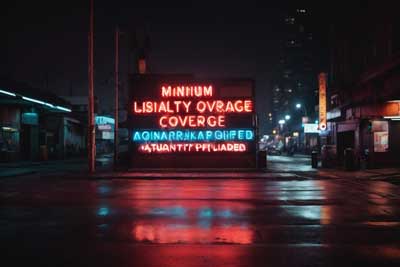Car Insurance Coverage in Texas
Mandatory coverage for Lone Star drivers.
Buying Car Insurance in Texas
Buying car insurance is an important decision for all drivers in Texas and it’s also the law. You don’t want to mess with Texas and get caught driving without coverage. Texas has mandatory minimum liability coverage requirements, but experts recommend getting more protection.
In this guide to Texas auto insurance coverage, we’ll go over the main types of car insurance, look at auto insurance laws, examine how rates vary in different Texas cities, and provide tips for getting the right policy.
Texas Auto Insurance Coverage Types
There are several common types of car insurance coverage in Texas. Understanding what each cover can help drivers pick the right type of coverage for their specific needs and budget.

Liability Insurance
This is the minimum coverage required by law in Texas. It pays for damage or injuries you cause to others in an accident. There are two components to Texas liability insurance coverage.
- Bodily Injury Liability covers injuries to other people. The minimum is $30,000 per person and $60,000 per accident. However, experts recommend at least $100,000/$300,000.
- Property Damage Liability pays for damage to another person’s vehicle or property. The minimum is $25,000 but higher limits are recommended.
Most people will need greater protection than liability insurance provides. If you have a new or newer vehicle or truck, you should consider comprehensive coverage with higher limits.
Collision and Comprehensive Coverage In Texas
Collision insurance pays to repair or replace your vehicle if it is damaged in an accident. Even a minor fender bender can cost thousands of dollars to fix, so collision coverage is critical protection for drivers in Texas. Collision insurance will pay for repair costs no matter who is at fault for the accident. Without it, you would have to pay all repair bills out-of-pocket if the accident is your fault.
Collision coverage in Texas will pay for damage to your vehicle from hitting or being hit by another car or object. This includes damage from:
- Another vehicle
- An object like a guardrail, tree, or utility pole
- Rolling over
- Potholes
- Debris in the road
Your collision deductible is the amount you pay out-of-pocket before insurance kicks in. Common deductibles range from $250 to $1,000, though you can usually choose a higher or lower amount. The higher your deductible, the lower your monthly premium.

Who Needs Collision Insurance in Texas?
Most drivers in Texas should have collision coverage. It protects one of your largest assets against financial loss. Collision insurance is required if you have an auto loan or lease on your vehicle. Lenders want to guarantee they will be repaid for the vehicle’s value if it is totaled in an accident.
Collision coverage is optional for vehicles you own outright with no lien. But it is still a good idea for most drivers. The key factor is your vehicle’s value. If your car is worth more than you could afford to replace out-of-pocket, collision insurance is financially wise. To compare collision auto insurance rates where you live, enter your zip code and fill out a five-minute online application.
Comprehensive Insurance Coverage In Texas
Comprehensive insurance covers damage to your vehicle from incidents other than collisions. This can include:
- Theft
- Vandalism
- Storm damage (hail, flood)
- Fire
- Falling objects like tree branches
- Explosions
- Civil unrest like riots
Like collision, comprehensive coverage pays to repair or replace your vehicle if it is damaged by these types of incidents. It also covers damage from hitting or being hit by an animal. Your comprehensive deductible applies to each claim.
Who Needs Comprehensive Insurance?
Comprehensive coverage is optional but recommended for most drivers in Texas. As with collision coverage, it makes the most financial sense if your vehicle is worth more than you could pay for repairs or replacement out-of-pocket.
Comprehensive claims are common in Texas, especially from severe weather. Hailstorms in Dallas, San Antonio, Houston, and other cities frequently cause costly auto damage. Comprehensive insurance can be a lifesaver for covering these expensive repairs.
Theft and vandalism are other realities in urban areas. Over 75,000 vehicles are stolen in Texas each year. Comprehensive insurance will replace your vehicle if it is stolen.


What is Not Covered by Collision and Comprehensive Coverage in Texas?
Collision and comprehensive insurance have some exclusions.
Collision does not cover:
- Damage from vandalism, weather, theft, or fire. These are covered only by comprehensive.
- Mechanical breakdowns or damage from lack of maintenance.
- Damage that occurs if the vehicle was used for commercial purposes like delivery driving.
- Damage if the driver was committing a crime like drunk driving.
Comprehensive exclusions include:
- Damage from an accident or collision with another car or object.
- Mechanical breakdowns.
- Theft of personal items from inside the vehicle. These may be covered by homeowners or renters insurance.
- Damage if the car was being used for racing or commercial purposes.

Getting the Right Coverage Limits
The insurance provider will pay collision and comprehensive claims up to the vehicle’s current cash value minus any deductible. Be sure your limits are enough to replace your vehicle in the event of a total loss.
Texas drivers are only required to carry minimum liability coverage. But collision and comprehensive insurance provide valuable protection for your asset. Carrying the right limits prevents you from taking a large financial hit after an accident or other incident.
Uninsured and Underinsured Motorist Coverage
This protects you if you’re hit by a driver with no insurance or insufficient coverage. It applies to injuries to you and your passengers. Texas requires minimums to match your liability limits. Higher amounts are recommended.
Personal Injury Protection (PIP)
Also called “no-fault” coverage, PIP pays for immediate medical expenses for you and your passengers, lost wages, childcare, and more. It’s not mandatory in Texas but can be useful extra protection.
Other Coverages To Consider
Gap insurance, rental reimbursement, roadside assistance, and rideshare coverage are other options available to Texas drivers. Gap insurance pays the difference between what your car is worth and what you owe if it’s totaled. Rental coverage pays for a rental car if yours is in the shop after a claim. Roadside assistance provides on-site mechanical help if you break down. Rideshare coverage adds protection for Uber and Lyft drivers.
Top 10 Most Expensive and Cheapest Texas Cities for Car Insurance
Car insurance rates can vary widely between cities in Texas. Here are some of the most and least expensive places:
Most Expensive:
- Houston
- Dallas
- Austin
- San Antonio
- Fort Worth
- El Paso
- Arlington
- Corpus Christi
- Plano
- Garland
Houston tops the list as the Texas city with the costliest average car insurance premiums, which run around $1,980 per year for full coverage. Rates are high due to factors like traffic congestion and high crime.
Cheapest Cities For Car Insurance in Texas
- Baytown
- Brownsville
- Pasadena
- Pearland
- League City
- Allen
- Edinburg
- Lewisville
- Pharr
- Missouri City
Drivers in these cities enjoy some of the lowest average rates for full coverage, around $1,510 per year. Low population density, mild weather, and lower accident rates help keep premiums affordable.
Texas Auto Insurance Laws
Texas sets legal requirements for insurance coverage. Here are some key regulations:
- State minimum liability limits are 30/60/25 as explained above. Proof of insurance is required.
- Uninsured motorist protection must equal your liability limits unless declined in writing.
- Personal injury protection is optional. It can provide up to $2,500 for medical bills, 85% of income lost, childcare, and funeral costs.
- Driving without insurance can lead to fines of $175 to $350 for a first offense. Repeat violations can bring fines from $350 to $1,000.
- Insurance cards must be available when driving and show the policy number, company, vehicle, and expiration date. Digital versions are allowed.
- Insurers cannot refuse to renew policies solely because of age, location, or lack of prior insurance.
- Deductibles cannot exceed $1,000 unless requesting a higher amount in writing.
- Discriminatory underwriting is prohibited based on credit history or lack of prior insurance.
Texas is a “fault” state where the driver responsible for an accident must pay for resulting expenses. Following its insurance laws is important to avoid legal issues after a crash.
How to Get the Right Car Insurance in Texas
Shopping wisely is the key to getting adequate coverage at the lowest rates in Texas. Consider these tips:
- Compare quotes from at least three insurance providers. Rates can vary widely.
- Look for discounts like safe driver, good student, defensive driving, and multi-policy. Ask providers to explain all available savings.
- Raise deductibles to lower premiums but don’t increase them past what you can afford to pay out-of-pocket.
- Drop collision and comprehensive coverage on older cars worth less than 10 times the premium.
- Consider usage-based or pay-per-mile plans if you drive very little. They can save money for low-mileage drivers.
- Maintain good credit since insurers use credit-based insurance scores to set rates.
- Ask about group insurance through associations or alumni organizations. It may provide a discount.
- Take an approved defensive driving course every few years for lower premiums.
Texas Truck Insurance Coverage
- Larger vehicles often cost more to insure due to expensive parts. Insurance for a Ford F-150 can run 10-15% higher than a sedan.
- Liability limits should be increased to account for the greater damage trucks can cause in accidents. 100/300/50 is a common recommendation.
- Collision coverage is critical since repairs for trucks are costly. A minor fender bender on a pickup can easily exceed $1,000.
- Comprehensive coverage also pays because trucks have high theft rates. Add a low deductible like $250-$500 to avoid large out-of-pocket costs.
- Commercial auto policies have specialized coverage including hired/non-owned liability, rental reimbursement, tools/equipment, tarps, and harbor marine liability.
- Food truck insurance is unique with protection for spoilage, loss of income, commercial-grade equipment, and events coverage.
- Tow truck insurance varies by state but often includes on-hook coverage for damage to vehicles in tow. Garagekeeper’s coverage for customer vehicles is also common.
The largest difference in insuring trucks versus personal cars is the need for higher liability limits and physical damage coverage to fully protect against the greater risks. Working with a knowledgeable agent is key to getting the right commercial or personal truck policy.
The Final Word On Texas Auto Insurance Coverage
Finding the right auto insurance coverage in Texas means understanding the different coverage types, comparing rates intelligently, and purchasing enough protection. Following the state’s minimum liability requirements is a good start but you need to get coverage that fully protects you financially.
Looking into additional coverages while also looking for available discounts can help drivers get the best rates in Texas. With some smart shopping, Texas motorists can cruise the open roads worry-free with solid coverage at the best possible rates.
